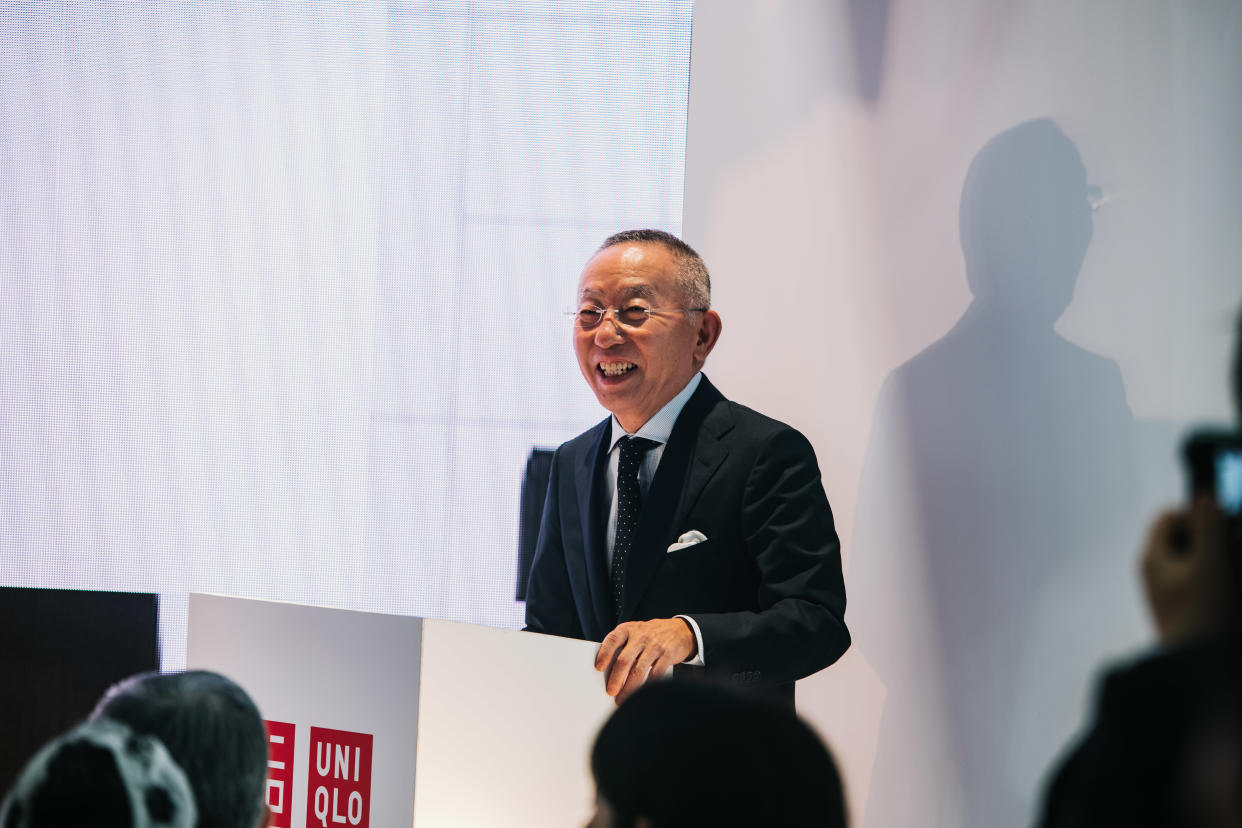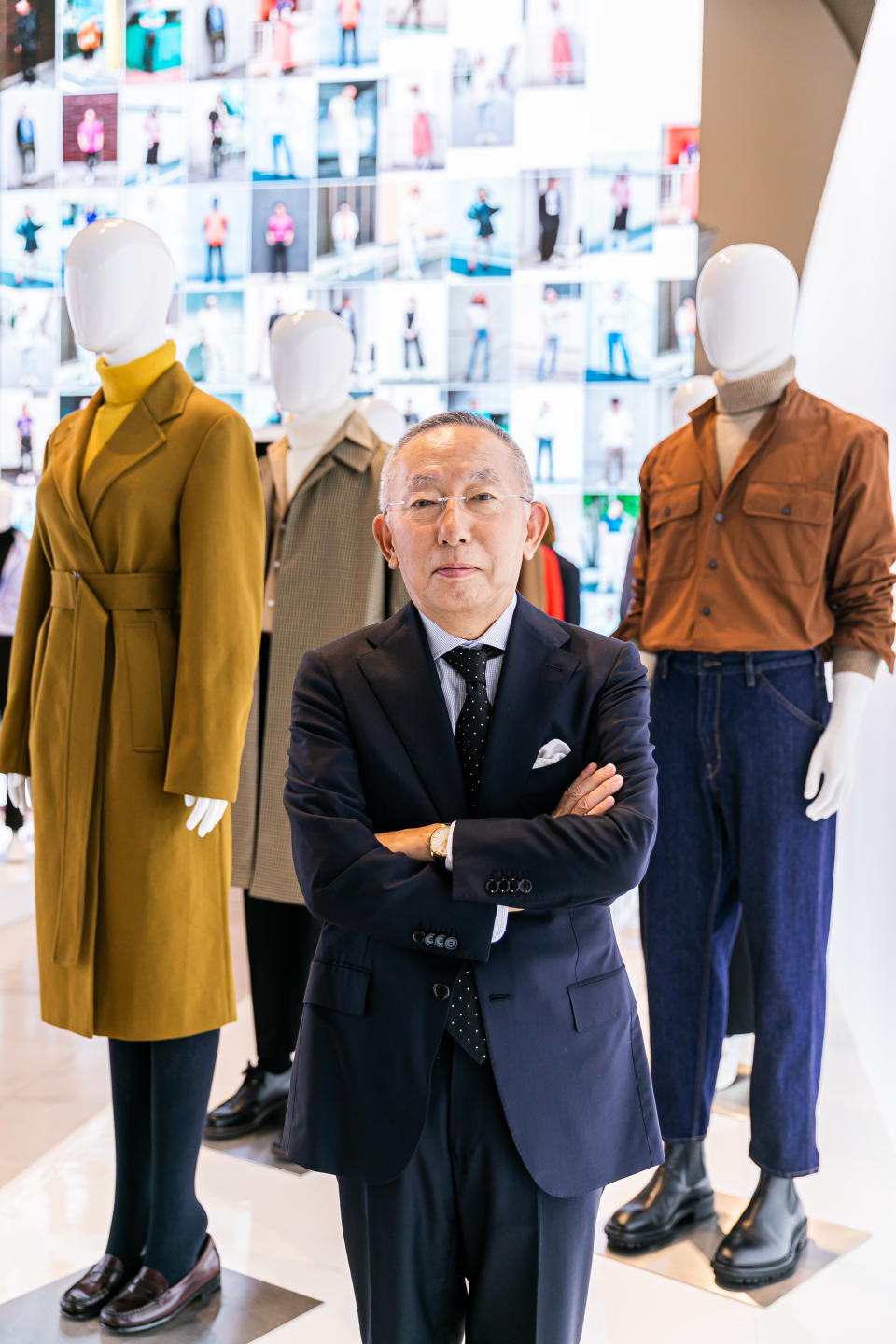Uniqlo’s president Tadashi Yanai wants to make durable clothing, not fast fashion

LONDON – As president of Uniqlo, Tadashi Yanai, the son of a tailor, has grown the clothing-retail brand to be one of the biggest in the world. He even set a revenue target of five trillion yen (S$74 billion) in sales per year by the year 2020 for his company, Fast Retailing, which counts Uniqlo, Theory, Helmut Lang, and J Brand as some of its fashion labels. While the thought of such lofty goals gives us heart palpitations, Yanai, as ambitious as he was when he set that target, feels like he’s taking a more meaningful approach today.
“I wanted to make this company the most respected business in the world, so we need to ensure we produce very good garment products, we attract talent and hire a team that creates very good products. So it's not necessarily a quantitative goal, but a qualitative goal to become the best ever company,” he said to reporters at Somerset House, which was the venue for a LifeWear exhibition in London last month, showcasing the technologies behind some of his famous products like Heattech and 3D knitwear up-close.
READ MORE:
The labour market is so tight, Uniqlo wants to pay top employees $280,000
Which countries pay the most at Uniqlo?
In 2017, Yanai was recognised by Forbes magazine as one of the 100 Greatest Business Minds. In 2014, Uniqlo was awarded Retailer of the Year by the World Retail Congress, and he was ranked among the Best Performing CEOs in the World by Harvard Business Review. He has been named in TIME magazine’s list of 100 Most Influential People in the World and has also received a Lifetime Achievement Award from CNBC. In addition to his role at Fast Retailing, Yanai has been an external director of Softbank Corp., a Japanese listed company on the Tokyo Stock Exchange (TSE) that is engaged in the telecommunications and Internet business, since June 2001.
Yahoo Lifestyle Singapore had a chat with Yanai on using innovative technology to create products, his personal vision for growth in the next five years and the dire need to look for his successor.
How does Uniqlo take a more sustainable approach in terms of production, material innovation and the future of fashion?
We take a look at our brick-and-mortar stores. Take China as an example. When you go back 20 years to 30 years ago, nobody in China was able to imagine how it has evolved now. You’ll need electric vehicle(s) because it has less impact on the environment. China is so advanced, that’s why Alibaba and Tencent are both very active in this space. Environmental issues and digital technology have to go hand-in-hand; without the right digital technology, we are not able to solve all of the environmental challenges.
You mentioned technology a lot, how do you define Uniqlo – as a digital high-tech company or still as a clothing company?
We are not an IT or digital company. We want to be a company which uses IT technology very well, because IT or digital technology are both important infrastructures to have today. Look at Alibaba and Baidu. You make a leap and go beyond the fixed phone line; everyone has a smartphone, and you are able to do everything cashless.

What's your takeaway to make your company as nimble and agile as a startup?
Each of our employees need to wear a top leader’s hat; they need to have a top leader mindset skill. When an organisation grows, people tend to look at their boss and superiors, rather than customers. People will start working on creating reports for the sake of reports and they will assume creating reports is their job. That’s no good; so we have to make sure that doesn’t happen in our company. We need to ensure in each store, we are addressing the needs of our customers, we are on top of stock take, and these steps would help us remain agile.
Singapore is known to the world as an innovation hub. Do you see the company using Singapore as a hub to launch any new innovative products first?
I know some of these tech giants are using Singapore as a headquarters. But you know, unlike tech giants Facebook and Google, we are in need of real stores, and we do have our regional headquarters located in Singapore. I think there’s a Harvard graduate who's running a very significant internet business, and his company (headquartered in Singapore) is called Grab. Yeah, I'm sure that more and more people will emulate him and there will be more people like him or her emerging in the industry.
How do you envision brick-and-mortar stores in the coming future?
Based on our LifeWear exhibition, you can already imagine how our brick-and-mortar stores would evolve. We are leveraging on technology for our business and technology doesn’t necessarily mean high tech; we also combine both low and high tech for our retail business. The title of our exhibition is ‘The Art and Science of LifeWear’; we need to incorporate both art and science in our day-to-day.
What is your personal vision for Uniqlo to grow in the next five years? Is it to become the number one fashion retailer?
You know what, that's what I used to think. But nowadays, I tend to think that is probably less meaningful. Obviously, if you’re running a business, the size is important but you’ll also want to make sure you do a good job. I wanted to make this company the most respected business in the world, so we need to ensure we produce very good garment products, we attract talent and hire a team that creates very good products. So it's not necessarily a quantitative goal, but a qualitative goal to become the best ever company.

Did you believe 20 years ago, Uniqlo would have been this successful?
I believed we would come this far. When I was younger, my big dream was to maybe build 30 stores and rake US$30 million dollars in revenue in the United States. That was then; you can do it too!
What innovations are you proudest of?
Probably opening the first Uniqlo store in Hiroshima in 1984 was the innovation I am proudest of.
Let me tell you a story; when I first opened the store, my sentiment was, oh I have discovered a gold mine. So many customers were rushing to enter our store, and we had to limit the number of people coming in. Customers were coming from the Yamaguchi prefecture, which is a rather rural part of Japan. As you know, Hiroshima was the first city where an atomic bomb was dropped.
You mentioned that Uniqlo is not fast fashion. What do you think is wrong with being associated as fast fashion? Is it important for you to build a brand image?
Fast fashion is going out of fashion. Fast fashion is not necessarily durable; maybe you can wear for one year but not the following year because they are not well made.
We want to offer clothing that could be wearable for a long period of time, that is durable. Our partnership with Toray will allow us to develop materials that are innovative and we both share a common thread when it comes to management principles. We believe in the long-term research that will benefit the customers.
What is the biggest challenge in running this business?
Well, probably looking for my successor.
You mentioned in interviews that you don’t mind the leader to be female?
I believe women need to be aggressive, aspirational and ambitious. So many women say, oh I’m fine with middle management roles, I don’t have to be one of the top leaders. They are so modest! I want to encourage more women to be ambitious.
What good qualities should a leader possess?
Being modest, quick-thinking, deep thinker. Those are challenging qualities but that’s required to build a business that lasts. I’m desperately in need of my successor.
Since you've appointed your sons as the company directors, how has it been like working with them? How do you maintain a professional relationship with family members?
It’s a challenge but there is no choice. Growing into the roles to becoming a chairperson and vice-chairperson is challenging, and I educate both of my sons. In doing so, I wear a professional hat.
This story is the result of a trip that was sponsored by Uniqlo.



